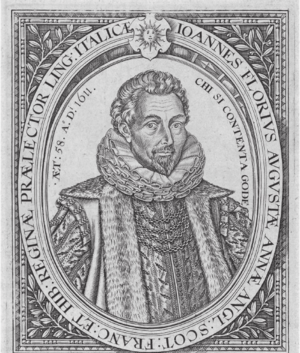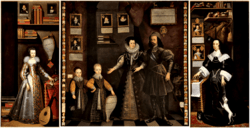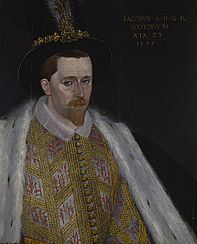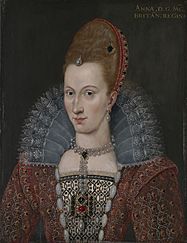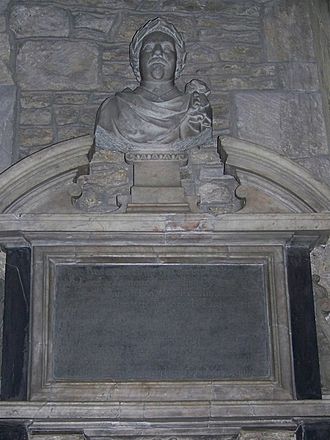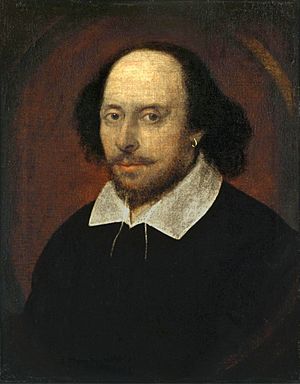Samuel Daniel facts for kids
Quick facts for kids
Samuel Daniel
|
|
|---|---|
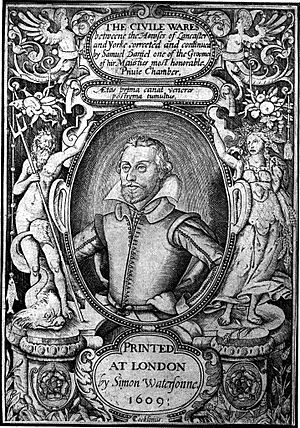
Frontispiece engraving for The Civil Wars (1609) by Thomas Cockson
|
|
| Born | 1562 Somerset, England |
| Died | October 1619 Beckington, England |
| Resting place | St George's Church, Beckington (buried 14 October 1619) |
| Occupation | Poet, playwright, and historian |
| Education | Magdalen Hall (now Hertford College), Oxford |
| Period | Late-Elizabethan and early-Jacobean eras |
| Years active | 1585–1619 |
| Notable works |
|
| Relatives | John Danyel (brother) |
Samuel Daniel (1562–1619) was an English poet, playwright, and historian who lived during the late Elizabethan era and early Jacobean era. He was very creative and tried new things in many types of writing.
Some of his most famous works include Delia, a collection of sonnets (a type of poem). He also wrote The Civil Wars, a long poem about the wars between the English royal families. Other important works are Musophilus, a poem written as a conversation, and A Defense of Rhyme, an essay about English poetry.
Many people thought Daniel was one of the best writers of his time. His work greatly influenced other writers, including William Shakespeare. Even centuries later, his writings inspired Romantic poets like Samuel Taylor Coleridge and William Wordsworth. A famous writer named C. S. Lewis once called Daniel "the most interesting man of letters" from England in the 1500s.
Contents
Samuel Daniel's Life and Writing Career
Early Life and Education
We don't know much about Samuel Daniel's early years. A writer named Thomas Fuller said Daniel was born near Taunton in Somerset, England. We know for sure that he started studying at Oxford University in 1581 when he was 19. He went to Magdalen Hall, which is now Hertford College.
Daniel did not finish his degree at Oxford. Another historian, Anthony à Wood, wrote that Daniel preferred "easier and smoother studies" instead of difficult subjects like logic.
While at Oxford, Daniel met John Florio, an author and translator who taught Italian at the university. In 1582, Daniel wrote a Latin poem for Florio's book, Giardino di Recreatione. They remained friends for many years. In 1603, Daniel wrote a special poem for Florio's translation of Michel de Montaigne's Essays. In a later edition, Daniel called Florio "my dear friend and brother." This made some people think they were related by marriage, but there's no proof.
First Published Work and Early Supporters
Daniel's first published work was The Worthy Tract of Paulus Jovius in 1585. This was his translation of an Italian book about emblems (pictures with hidden meanings). Simon Waterson, who became Daniel's main publisher, printed this book.
Daniel dedicated this first book to Sir Edward Dymoke, a knight who served the Queen. This was the start of Daniel's many important friendships with wealthy supporters, known as patrons. These patrons helped him with his writing career.
Sir Edward Dymoke wrote a letter for Daniel, which allowed him to live in the English embassy in France from 1585 to 1586 to continue his studies. He returned to Europe between 1590 and 1591, sometimes traveling with Dymoke. In Italy, Daniel and Dymoke met the poet Giovanni Battista Guarini. They defended English as a language that could produce great poetry and writers.
Mary Sidney's Support and Famous Poems
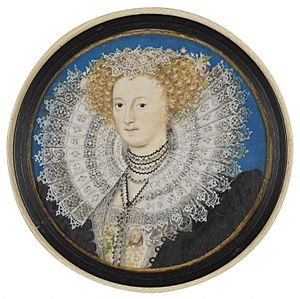
Daniel's writing career really took off in 1591. Some of his Delia sonnets were secretly included in a book by Sir Philip Sidney after Sidney had died. Sidney's sister, Mary Sidney, the Countess of Pembroke, was upset about this. The book was then taken off sale.
In 1592, Daniel published his own official collection of poems, called Delia. It also included a historical poem, The Complaint of Rosamond. Daniel dedicated Delia to Mary Sidney. He apologized for his poems being in the unauthorized book, saying a "greedy printer" had tricked him.
Soon after, Daniel was invited to live with the Pembroke family. He might have taught Mary Sidney's son, William Herbert. He also joined a group of writers supported by Mary Sidney, called the Wilton Circle. This group included famous poets like Edmund Spenser and Michael Drayton.
Other poets and scholars, like Thomas Nashe and Edmund Spenser, quickly praised Daniel's work. Spenser, who was England's most respected living author at the time, even wrote about Daniel in his poem Colin Clouts Come Home Again.
From 1592 to 1593, with Mary Sidney's help, Daniel wrote The Tragedy of Cleopatra, published in 1594. Mary Sidney asked him to write it as a follow-up to a French play she had translated. Both plays were written in the style of closet drama, which means they were meant to be read, not performed on stage.
New Patrons and The Civil Wars
After Cleopatra was published, Daniel left Mary Sidney's household and faced money problems. Charles Blount, Baron Mountjoy, then took him in. This is mentioned in the first part of Daniel's long poem, The First Four Books of the Civil Wars Between the Two Houses of Lancaster and York, published in 1595. This poem was about the Wars of the Roses. It praised Mountjoy and his friend Robert Devereux, the Earl of Essex. Daniel had worked at Essex's home while writing the first version of his poem.
Between 1595 and 1599, Daniel added a fifth book to The Civil Wars. He included this longer poem in The Poetical Essays of Samuel Daniel, a collection of his works published in 1599 and dedicated to Mountjoy. This collection also had updated versions of Delia, Rosamond, and Cleopatra. It also introduced two new works: Musophilus and A Letter From Octavia to Marcus Antonius.
Musophilus was dedicated to Daniel's friend, the poet Fulke Greville. It was a poem written as a conversation between a poet and a courtier (someone who works at court) about whether writing poetry is more valuable than worldly pursuits. A Letter from Octavia was dedicated to Margaret Clifford. Daniel wrote this poem to show sympathy for Mark Antony's wife, Octavia, whose husband was unfaithful.
In the late 1590s and early 1600s, Daniel became a teacher to young Anne Clifford, the daughter of the Countess of Cumberland. Anne Clifford always remembered Daniel fondly. She even included his portrait and his books in a large family painting called The Great Picture.
In 1601, a new collection of Daniel's writings came out, called The Works of Samuel Daniel, Newly Augmented. It had updated versions of his earlier works, including an even longer Civil Wars with a sixth book. This version of The Civil Wars was dedicated to Queen Elizabeth. This showed that Daniel was now seen as one of the most important poets of his time, perhaps even taking the place of Edmund Spenser, who had died in 1599.
Working for the Royal Family
After Queen Elizabeth died and King James became king in 1603, Daniel quickly became involved with the new royal court. With help from Lucy Russell, Countess of Bedford, he presented his poem Panegyrick Congratulatory to the King's Most Excellent Majesty to King James in April 1603. A revised version of this poem was published later that year, along with Daniel's Epistles (letters in verse) and his essay A Defense of Rhyme.
Daniel became very close to King James's wife, Queen Anne. She asked him to write a masque (a type of court entertainment with music, dance, and costumes) called The Vision of the Twelve Goddesses. It was performed at Hampton Court in January 1604. In February, Daniel was given the job of reviewing plays for the Children of the Queen's Revels, a group of child actors.
However, Daniel faced a problem with his own play, The Tragedy of Philotas, performed for King James in January 1605. Some people thought it was a hidden comment about the Earl of Essex, who had been executed in 1601. Daniel had to explain himself to the Privy Council (a group of royal advisors). He was found innocent, but the incident was embarrassing. He wrote apologies to his friend Charles Blount and to Robert Cecil, King James's advisor. In a poem for the printed version of Philotas, Daniel wrote that he felt "years hath done this wrong, / To make me write too much, and live too long."
Even with the Philotas problem, Daniel's reputation with King James didn't suffer for long. In 1605, the play was included in his published collection, Certain Small Poems. In August, his play The Queen's Arcadia was performed for Queen Anne and Prince Henry at Oxford.
In April 1606, Daniel's friend and patron, Charles Blount, died. Daniel wrote a poem for him, A Funeral Poem Upon the Death of the Noble Earl of Devonshire. This poem was included in the 1607 edition of Daniel's Certain Small Works. The title page of that collection was the first to call Daniel "one of the Grooms of the Queen's Majesty's Privy Chamber", a high position he shared with his friend John Florio. This collection also had a much-changed version of The Tragedy of Cleopatra, which was likely easier to perform on stage.
Later Life, History Writing, and Death
In 1609, Daniel published the final version of The Civil Wars, which now had eight books. He dedicated this work to Mary Sidney, who had first helped him become famous. He mentioned that he wanted to continue the story up to the marriage of Henry Tudor (Queen Elizabeth's grandfather) in 1486. However, the poem only went up to Edward IV's marriage in 1464. In the dedication, Daniel also said he planned to write a prose "History of England," which became his main project for the rest of his life.
Daniel spent most of his last ten years living quietly in a country house in the village of Beckington in Somerset. In 1610, he wrote the masque Tethys' Festival, performed at Whitehall to celebrate King James's son, Henry, becoming Prince of Wales. Over the next few years, Daniel researched English history, getting help from his friends, the historians William Camden and Robert Cotton.
In 1612, he published the first part of his history book, The First Part of the History of England. This covered early English history from the Norman Conquest (1066) to the end of King Stephen's reign (1154). In 1614, he wrote the play Hymen's Triumph, performed for a royal wedding at Queen Anne's palace.
The final version of Daniel's history book, The Collection of the History of England, was published in 1618. It included material from the first part and continued up to the end of Edward III's reign (1377). This was the last of Daniel's works published while he was alive.
The last work Daniel wrote was a poem in 1618 for James Montague, Bishop of Winchester. It was meant to comfort the Bishop, who was sick. The poem suggests Daniel might have been suffering from the same illness.
It's not clear if Daniel was ever married. A "Mrs. Daniell" was buried in Beckington in March 1619, seven months before Daniel died, but we don't know if she was his wife. Samuel Daniel made his will on September 4, 1619, and died the next month. He was buried on October 14, 1619, at St George's Church in Beckington. In the 1650s, his former student, Anne Clifford, had a memorial built for him at the church.
Samuel Daniel's Works
Many of Samuel Daniel's poems and plays were printed many times during his life. Often, these new editions were changed and updated. The list below shows some of Daniel's main works and how varied his writing was. It includes a short description, when it was first published, and when it was significantly changed.
- Delia – A collection of sonnets. Parts were published in Philip Sidney's Astrophel & Stella (1591). The first official, complete version came out in Delia and The Complaint of Rosamond (1592). It was revised and expanded in 1594 and 1601.
- The Complaint of Rosamond – A long historical poem about Rosamund Clifford, who was the mistress of King Henry II. First published in Delia and The Complaint of Rosamond (1592). Revised in 1594.
- The Tragedy of Cleopatra – A play about Cleopatra's death after Mark Antony died. It was a Senecan tragedy, meant more for reading than acting. First published in 1594. Greatly revised in 1607 to be more suitable for the stage.
- The Civil Wars Between the Houses of Lancaster and York – A long poem about the "Wars of the Roses," inspired by a Roman epic poem. The first four books were published in 1595. A fifth book was added by 1599, and a sixth in 1601. The final version, with eight books, was published in 1609.
- Musophilus, or A Defense of All Learning – A long poem written as a conversation between a poet (Musophilus, meaning "lover of the muses") and a courtier (Philocosmus, meaning "lover of the world"). It was first published in 1599. It was revised and shortened in 1607.
- A Letter from Octavia to Marcus Antonius – A historical poem written as a letter. First published in 1599.
- A Panegyrick Congratulatory to the King's Most Excellent Majesty – A poem given to King James when he became king of England. Published in 1603.
- Epistles – Letters written in verse, giving advice to important people like Sir Thomas Egerton and Lady Anne Clifford. First published in 1603.
- A Defense of Rhyme – A prose essay defending why English poetry doesn't have to follow strict classical rules. It was a response to another writer's ideas. First published in 1603.
- The Vision of the Twelve Goddesses – One of the first masques (court entertainment) performed for the Stuart royal family. An unofficial version was published in 1604, and Daniel's official version came out the same year.
- Ulysses and the Siren – A short poem discussing whether an active life or a thoughtful life is better. First published in 1605.
- The Tragedy of Philotas – A play that mixed serious drama with elements of popular theater. First published in 1605.
- The Queen's Arcadia – A play that was a mix of comedy and tragedy, in the style of Italian pastoral plays (plays set in the countryside). Published in 1606.
- A Funeral Poem Upon the Death of the Noble Earl of Devonshire – A poem written after the death of Charles Blount, Baron Mountjoy. Published in 1606 and revised in 1607.
- Tethys' Festival – A masque performed in 1610 to celebrate King James's son, Prince Henry, becoming Prince of Wales.
- Hymen's Triumph – A pastoral play performed for a wedding in 1614. Published in 1615.
- Collection of the History of England – A history book about England, from its earliest days up to the reign of Edward III. The first part was published in 1612. The final version, published in 1618, was the last of Daniel's works printed during his lifetime.
In 1623, Samuel Daniel's younger brother, John Danyel, who was a musician, published a collection of his brother's poetry called The Whole Works of Samuel Daniel Esquire in Poetry. This collection was dedicated to King James's son, Prince Charles.
Daniel and Shakespeare
Samuel Daniel was born a year or two before William Shakespeare and died three years after him. Both writers started their careers in the 1590s and finished in the 1610s. Both were successful and seen as important authors. Shakespeare was more known for popular plays, while Daniel was known for courtly poetry and noble supporters.
Experts generally agree that many of Shakespeare's plays and poems were influenced by Samuel Daniel's works. However, whether Shakespeare's plays influenced Daniel's works is still debated.
John Pitcher, a scholar who studies Samuel Daniel, said that Shakespeare "followed and drew freely on his every publication." This shows how important Daniel was as a writer.
How Daniel Influenced Shakespeare
Here are some examples of how Daniel's works might have influenced Shakespeare:
- Delia and Shakespeare's sonnets – There are many similarities between Shakespeare's sonnets and Daniel's Delia. This suggests that Daniel's poems inspired Shakespeare. Daniel used the sonnet structure (three stanzas and a final two-line rhyme) that we now call "Shakespearean" before Shakespeare did.
- Rosamond and Romeo and Juliet – Romeo's last speech over Juliet's body in Romeo and Juliet (written around 1593-1596) seems to have been inspired by the ending of Daniel's The Complaint of Rosamond (published in 1592).
- The Civil Wars and Richard II – Shakespeare's Richard II includes many details that are also in Daniel's The First Four Books of the Civil Wars (1595), but not in other historical sources. For example, the play shows Richard's queen, Isabel, as an adult, even though she was only ten years old historically.
- The Civil Wars and Henry IV, Part 1 – In Henry IV, Part 1, Shakespeare shows Prince Hal and Hotspur as being about the same age and rivals. Historically, Hotspur was much older than Hal. Shakespeare seems to have gotten this idea from Daniel's poem.
- The Civil Wars and Henry IV, Part 2 – There are strong similarities between King Henry's death scene in Shakespeare's play and Daniel's description of the king's death in his poem.
- The Civil Wars and Henry V – In Daniel's The Civil Wars, the ghost of Henry V asks a poet to write about his great victories. Scholars believe this partly inspired Shakespeare to use a Chorus and an "epic" feel in Henry V, which focuses on the king's victory at the Battle of Agincourt.
- Musophilus and Julius Caesar – Shakespeare's Julius Caesar has parts that sound like Daniel's poem Musophilus, which was published around the time Shakespeare wrote the play.
- The Tragedy of Cleopatra and Antony and Cleopatra – Besides his main source, Plutarch's Lives, Shakespeare was inspired by Daniel's play for his complex character of Cleopatra, especially in the scenes leading to her death. Daniel's poem A Letter from Octavia might also have helped Shakespeare show sympathy for Antony's wife.
- Daniel's masques and The Tempest – The masque in Shakespeare's The Tempest might have been influenced by Daniel's Vision of the Twelve Goddesses and Tethys' Festival. These masques included similar Greek goddesses like Ceres and Juno.
Did Shakespeare Influence Daniel?
Here are some examples of how Shakespeare's works might have influenced Daniel's:
- Henry VI plays and The Civil Wars – Some researchers now think that parts of Daniel's The First Four Books of the Civil Wars might show influence from Shakespeare's Henry VI plays. These plays were performed by a theater company supported by Daniel's patron, Mary Sidney's husband, before Daniel's poem was published in 1595.
- Richard II and Daniel's changes to The Civil Wars – In the 1609 edition of The Civil Wars, Daniel describes Henry IV rejecting Richard II's murderer. This event is not in Daniel's usual historical sources but is highlighted in Shakespeare's Richard II.
- Henry IV plays and Daniel's changes to The Civil Wars – In the 1609 edition of The Civil Wars, Daniel added more material about King Henry IV's reign. This seems to have been influenced by Shakespeare's plays about that king.
- Antony and Cleopatra and Daniel's changes to The Tragedy of Cleopatra – There's a discussion about how much Daniel was influenced by Shakespeare's play when he revised The Tragedy of Cleopatra in 1607. Daniel made his play more "theatrical," but it still stayed closer to the older, classical style.
Personal Relationship
There's no direct proof that Daniel and Shakespeare were close friends or knew each other personally. However, they likely knew many of the same people, including John Florio, William Herbert, and Ben Jonson.
Daniel's Writing Style and Fame
During his lifetime, Daniel was considered one of the most important English writers. His writings brought new ideas to many types of literature, including sonnet collections (Delia), long narrative poems (Complaint of Rosamond), classical plays (Tragedy of Cleopatra), epic poems (The Civil Wars), conversation poems (Musophilus), literary essays ("Defense of Rhyme"), and letters in verse (Certain Epistles).
He continued to have fans for centuries after his death, and his works greatly influenced many other authors. John Milton used ideas from Daniel's works in his famous poem Paradise Lost. Samuel Taylor Coleridge especially admired Daniel, calling him "one of the golden writers of our golden Elizabethan age." Coleridge's friend William Wordsworth was also influenced by Daniel and included a long quote from Daniel's Epistle to the Countess of Cumberland in his poem The Excursion.
Even though Daniel's work became less known in the 1900s, he still had admirers. Many collections of old literature include parts of his Delia, Musophilus, and A Defense of Rhyme. In 1944, C.S. Lewis said Daniel "actually thinks in verse; thinks deeply, arduously." He called Daniel "the most interesting man of letters" from England in the 1500s.
One reason Daniel's works are less recognized today compared to some of his friends is his calmer, less emotional style. As C.S. Lewis noted, Daniel "thinks in verse." His poetry often uses precise language for thinking deeply and questioning, rather than strong, emotional images. In Musophilus, Daniel described his poetry as "a speaking picture of the mind."
Some people criticized his conversational style, even when he was alive. Another poet, Michael Drayton, said Daniel was "too much historian in verse" and that his rhymes were smooth but his style was "better fitted prose." However, these same qualities made him appealing to Coleridge and Wordsworth. They believed that good poetry could use language similar to good prose. In the 1700s, the critic Robert Anderson wrote that Daniel's language was "rational" and "approaches nearer the style of the 18th than the 16th century."
Some parts of Daniel's writing might even feel more modern than his own time. Much of his work shows sympathy for women who keep their dignity even when treated unfairly by men. He showed this in his poems for Mary Sidney, Letter from Octavia, and especially in his Epistle to Countess of Cumberland. His thoughtful, self-reflective poetry is similar to some modern poetry, unlike the more decorative style of many writers back then.
In A Defense of Rhyme, Daniel believed that every culture and time period had valuable ideas and writing to offer. He didn't think poetry should be forced to follow old classical rules, which was different from many thinkers of his time. In Musophilus, he wisely saw the benefit of writing in English, even though the language was only used on one small island. He wrote, "who in time knows whither we may vent / The treasure of our tongue... Or who can tell for what great work in hand / The greatness of our style is now ordained."
Daniel also humbly admitted that he, like all humans, can make mistakes and hold strong opinions that might later be seen as wrong. He showed this in his Collection of the History of England:
Pardon us antiquity, if we miscensure your actions which are ever (as those of men) according to the vogue, and sway of times, and have only their upholding by the opinion of the present. We deal with you but as posterity will with us (which ever thinks itself the wiser) that will judge likewise of our errors according to the cast of their imaginations.
In many of his works, Daniel showed great respect for the power of written language ("blessed letters") to connect people across different cultures and generations. As he wrote in Musophilus:
O blessed letters that combine in one
All ages past, and make one live with all,
By you we do confer with who are gone,
And the dead living unto counsel call:
By you th'unborn shall have communion
Of what we feel, and what doth us befall.
 | William M. Jackson |
 | Juan E. Gilbert |
 | Neil deGrasse Tyson |


